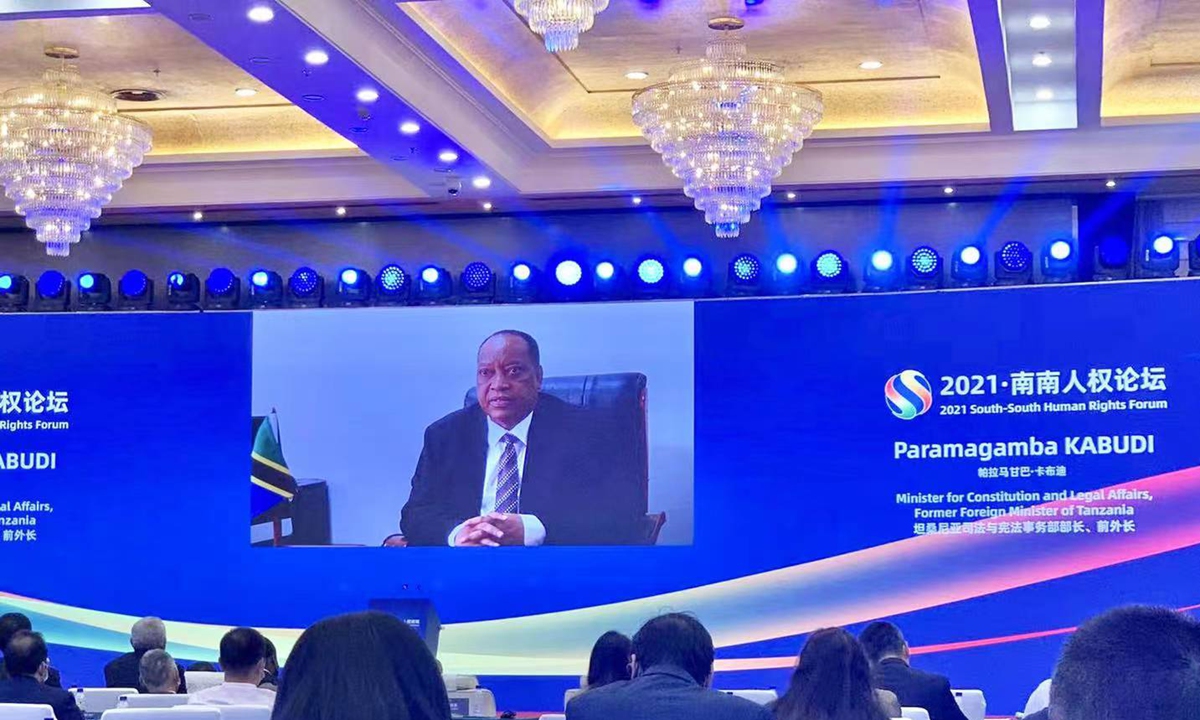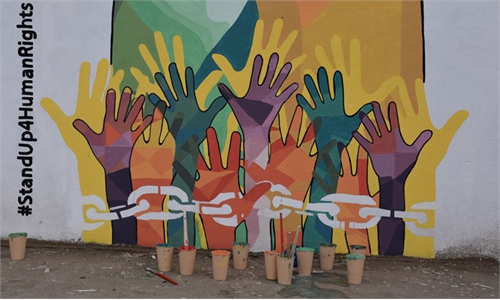South-South forum tackles human rights issues
Western system faces growing skepticism amid global challenges: experts

The 2021 South-South Human Rights Forum in Beijing. Photo: Xu Yelu/GT
High-level officials and experts from China and a dozen developing countries on Wednesday discussed the differences of the human rights systems in China and the US, as well as the potential of the future international human rights system facing challenges of global issues like the COVID-19 pandemic and climate change, at the 2021 South-South Human Rights Forum in Beijing.
Chinese President Xi Jinping sent a congratulatory letter to the forum, stressing that human rights practices are diverse. People of all countries should and can independently choose a path of human rights development suited to their national conditions. China is ready to work with other developing countries to promote the common values of mankind, practice true multilateralism, and contribute wisdom and strength to the sound development of international human rights, he said.
As the COVID-19 pandemic has changed the world completely and is still raging the world, how developing countries should address human rights issues in the post-COVID era while dealing with some Western countries' politicization of human rights became the focus of the forum, which kicked off one day before the US was to convene a "Summit for Democracy" on Thursday and Friday, with the aim of maintaining hegemony and containing China.
Addressing the forum, Shanghai Cooperation Organization Secretary General Vladimir Norov said that when the COVID-19 pandemic caused serious pressure on the global economy, the experience of China, the world's most populous country, in fighting poverty was very impressive.
China's Vice Minister of Foreign Affairs Ma Zhaoxu said that the situation "reminds us once again that the rights to subsistence and development are the primary and basic human rights. And we must put people and life first, give top priority to everyone's safety and health, and safeguard the value and dignity of human life.
"The West believes that only human rights issues that can be accepted by the courts can be regarded as human rights issues. However, in developing countries, where the rule of law is weak, it is difficult to adopt that concept. China's experience in promoting human rights shows that it is often more important to promote human rights through political means," Zhang Weiwei, director of the China Institute of Fudan University in Shanghai, said in his speech.
"There are more than half a million homeless people in the US, and tens of millions more who are considered poor by UN standards. With $2.3 trillion, if we follow China's model, we can eliminate extreme poverty in the world, but the American model has plunged the Afghan people into misery and suffering, and caused countless displacements in Afghanistan, which has become poorer than it was 20 years ago. This is a huge violation of human rights in Afghanistan by the US," Zhang said.
"The American political system has been hijacked by the military-industrial interests of the US, bringing disaster not only to the American people, but also to the whole world. How can such a country be qualified to talk to us about human rights?" Zhang asked.
"Since powerful nations are presumed to advance interpretations of international law that reflect their own values and interests, a rising China is facing more suspicion of derogating the established international human rights norms by making human rights 'weak, confusing and obscure'," Peng Qinxuan, an expert from the Wuhan University Institute of International Law, who attended the Wednesday forum, told the Global Times.
For example, some US politicians are accusing China over some so-called human rights issues while turning a blind eye to the continuing epidemic and mounting death toll in their country.
According to local media, the US had reported nearly 50 million coronavirus cases and nearly 800,000 deaths as of Tuesday.
Northern bias is difficult to erase, so China has turned its face to the South and is gaining more support in the international community on human rights causes with the coalition of the Like Minded-Group of Developing Countries and South-South Human Rights Cooperation, as China's proposal of Building a Community of Shared Future for Mankind acknowledges that improving human rights is a common cause for all, especially for developing countries, and the proposal urges international cooperation to promote development and advance human rights with an open and inclusive attitude, Peng noted.
Experts and officials also said that the politicization of human rights in the West is bringing great resistance to the solution of human rights problems in the world. They also noted that, especially against the background of modern global challenges like fighting against COVID-19, climate change, widening inequality, conflicts and the widespread economic recession, the existing international human rights system is facing increasing skepticism and disenchantment.
Given the circumstances, China's proposal can contribute more to the development of global human rights issues.
"China and some Western countries are helping developing countries in different ways and with different original intentions," Peng said.
"Western countries are helping developing countries in solving human rights issues to export their own values and political models, so as to transform these countries and make them follow their lead. But China is helping developing countries out of the concept of human solidarity," Peng noted.
Unlike the West, which only focuses on promoting its values to developing countries, China respects other developing countries' national conditions and cultures, Zhu Ying, a professor on human rights and international law at the Southwest University of Political Science and Law, told the Global Times on Wednesday.
More importantly, China is cooperating with other developing countries on human rights issues based on equity, mutual trust and multilateral cooperation, rather than taking a superior posture like the West, Zhu noted.

